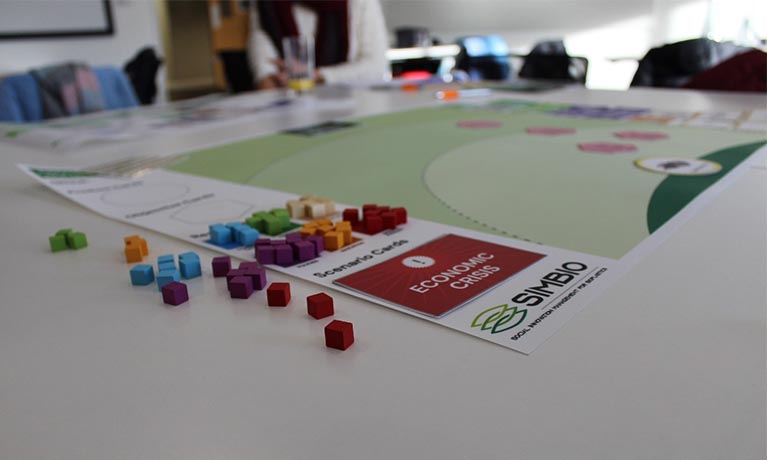By Macarena Beltran, Benny Tjahjono, David Bek, Jordon Lazell, Lahandi Baskoro, Anna Bogush
Unlocking the bioplastics supply chain
The Social Innovation Management for Bioplastics project – SIMBIO – led by the Centre for Business in Society in Coventry University and funded by the ESRC, aims to address the environmental and social challenges of bioplastics packaging throughout its entire supply chain. Focusing on bioplastics is important as the packaging industry faces an imperative to reduce the devastating environmental impacts created by fossil-fuel based plastics. The third and final SIMBIO lab entitled Prototyping Solutions was held on the 25th of November, 2021 online (via Zoom) and Onsite (TechnoCentre in Coventry). The lab aimed to evaluate the feasibility, practicality, and potential impacts of solutions that emerged from the second lab, which include: communication with consumers, end of life, policies, certification standards and labelling, education and development of specific products. The lab also aimed to prototype and test these solutions within the social innovation lab “container”.
Participants representing a wide range of stakeholders, including producers, academics, consumers, NGOs, waste management and government representatives, and other important organisations that are part of the bioplastic packaging supply chain, joined the lab to hear from industry experts and participate in two exercises. The event was kicked off with the welcome talk from Professor Nigel Berkeley, Institute Director in the Faculty of Business and Law. This was then followed by a reminder of the mission of the SIMBIO project and a recap from the previous labs from Professor Benny Tjahjono of Coventry University.
Views from industry experts with a wide range of expertise and backgrounds
The event featured presentations from industry experts who were invited to share their knowledge about the different streams of solutions. Kevin Vyse, Head of Technical, ProAmpac RAP, made an opening address that highlighted the timely need for a circular economy and systemic actions in the bioplastic sector. David Newman, Managing Director, Bio-Based and Biodegradable Industries Association (BBIA), presented the findings of a survey conducted with British shoppers, which explored communication issues with consumers, such as people’s [lack of] understanding of the current labelling system for plastics packaging.
Following this presentation, Alice Harlock, Membership and Services Manager from The On-Pack Recycling Label (OPRL), talked about labelling. She emphasised the idea that consumers need information at targeted touchpoints to influence their behaviour. Dr Erik Ansink, Associate Professor at the Department of Spatial Economics, Vrije Universiteit Amsterdam, shared the main findings of his study about recycling decisions for bioplastics. He suggested that educating consumers to change the default recycling behaviour needs efforts beyond logos and recycling information.
Leanne Williams, Policy Analyst from The Anaerobic Digestion and Bioresources Association (ADBA), reviewed certain waste management processes, regulation and policy (end-of-life) that need to be improved for the processing of bioplastics by the AD sector, Susan Jay, Sector Specialist from The Waste and Resources Action Programme (WRAP) shared with the participants the “Compostable plastic packaging guidance” which recommended the use of bioplastics materials for specific applications such as flexible compostable packaging “where it is likely there will be contamination of food waste and co-disposal could encourage food waste recycling – product and packaging can, in theory, be disposed of together” and rigid compostable packaging, primarily in closed systems.
Prof Mark Miodownik, Professor of Materials and Society, Department of Mechanical Engineering, Faculty of Engineering Sciences, UCL, shared some of the findings of his project “Big Compost experiment” and finally Iris Aquilina, leader of the Bioladies Network and Ambassador of BBIA, discussed the policy and regulatory landscape in the UK and EU around the adoption of bioplastics.
Prototyping Solutions for specific products under certain scenarios
The lab featured two workshop exercises with the participants. Firstly, participants were invited to join parallel break-out sessions to explore the feasibility, practicality and impact of the different solution streams explored by the speakers. On-site break-out sessions focused on specific products, end of life and policies. Break-out sessions delivered ample discussion on the complexities of these solutions.
Secondly, to facilitate the prototyping and testing of different solutions for the uptake of bioplastics products, the research team from CBiS and CAWR created a scenario board game inspired by the Scenario Exploration System produced by the European Union’s Policy Lab team. The latter is used to understand the systemic implications of different actions. Participants were divided into three groups. To create a realistic scenario environment, each group was assigned to a specific product (coffee pods, food caddy liners and ready meal trays) and a particular crisis scenario (e.g. climate change, prolonged pandemic and economic crisis) which encouraged participants to adapt their strategies.
The players were then invited to prioritise certain processes within the bioplastic supply chain (designed in the first social innovation lab) and assign limited resources within different time horizons (5, 10 and 20 years). Resources were related to the solutions streams explored. Players were also encouraged by the game masters to develop collaborative solutions. Whilst there were no winners or losers in each scenario game –the participants were encouraged to indicate which scenario is more feasible to be prototyped.
The discussions during the games have helped participants to think of ways of driving the uptake of biobased biodegradable plastics packaging. Furthermore, it was clear that such participatory approaches play an important role in bringing stakeholders from different sectors to co-create solutions and promote sustainability at the same time.
This project, “New Frontiers in Social Innovation Research: Social Innovation Management for BIOPlastics (SIMBIO)”, is funded by the Economic and Social Research Council. Please visit the project website: New Frontiers in Social Innovation Research: Social Innovation Management for BIOPlastics (SIMBIO) | Coventry University




Comments are disabled